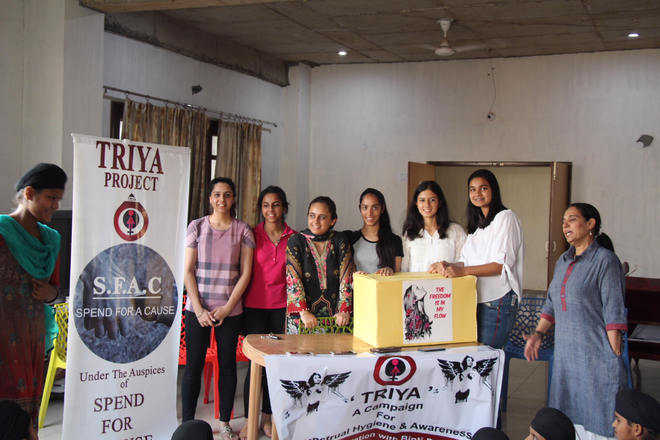Manpriya Singh
When the government’s way too busy with GST, poverty, terrorism and the young girls way too conscious to talk about periods, what do the menstrual activists do? Well, they take the matters, pads, pink dustbins into their own hands and set forth, hoping to take small steps that might be a giant leap for womankind someday.
That’s pretty much what these six Chandigarh-based girls did with their project Triya. “We thought this needed attention and that too at the grassroots level,” one of the co-founders, Eknoor Chahal, shares before getting us started about the survey that the group of six students, including Rehmat, Navya, Sumedha, Ridhi and Nehmat, have conducted in association with CII.
“The project is under the banner of Spend For A Cause, soon to be registered as an NGO,” shares Pooja Khosla, trustee for SFAC on how the initiative was taken long before celebrities put their pictures with sanitary napkins on Instagram and PadMan and Muruganantham became household names. “We have also collaborated with international NGO Binti and we are just awaiting our certificates,” adds Eknoor. Meanwhile, it’s the awareness drives about menstrual hygiene and generating funds that’s keeping them busy.
As for the survey, even that hasn’t been easy. “We really had to get the girls, selected in four key areas for the survey, out of their comfort zones and get them talking about periods. We found out that almost all of them are still using cloths and shy away from drying them in public,” she adds, while at a drive at Gur Aasra Trust in Sector 78, which is one in the series of drives to be taken till the World Menstrual Day, which happens to be on the 28th of this month.
The correct disposal
It’s not just the stigma that needs to be broken through to initiate baby steps. First comes the hygiene, then the disposal, yet another major environmental issue globally.
“The sanitary napkins get mixed with the normal waste and then segregation of the waste becomes almost next to impossible. Ideally napkins should be incinerated immediately after use,” she adds. “We are generating funds to be able to place incinerators at key areas, like NGOs that house girls and girl hostels.”
Till the incinerators that cost around Rs 25,000 become a reality, there are pink dustbins to the rescue. From the menstrual dignity to menstrual hygiene to menstrual disposal, they are taking small yet steady steps.
Miles to go
Some thought he was possessed, some thought he was just being a pervert when he started questioning young women about sanitary pads.
But Arunachalam Muruganantham did all this in his quest to make cheap sanitary napkins for his wife, which, eventually, went on to revolutionise menstrual health for rural women around the globe.
Muruganantham, who hails from Coimbatore in Tamil Nadu, says he still has miles to go in his mission “to make menstrual hygiene accessible and affordable for everyone”.
“It all started for my wife (Shanthi) and now it has gone global and become a revolution. I am very glad and happy with where my mission has reached,” Muruganantham said.
“People have definitely changed. More people are having open conversations about sanitary hygiene... 20 years ago no one dared to speak about it. Today, taboos have been broken. But India is not made up of metros alone. We have 600,000 villages and the awareness level is low. We have miles to go in our mission to make menstrual hygiene accessible and affordable for everyone,” he added. His story found its way into Bollywood in a more dramatised way through Pad Man, with actor Akshay Kumar driving the project with his star power. —IANS
Unlock Exclusive Insights with The Tribune Premium
Take your experience further with Premium access.
Thought-provoking Opinions, Expert Analysis, In-depth Insights and other Member Only Benefits
Already a Member? Sign In Now










